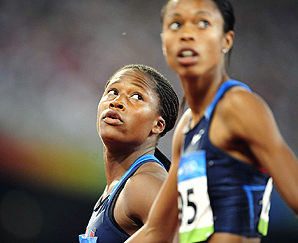
Forgettable night for U.S. runners
Let's start with Saturday night. Lauryn Williams had easily advanced through a preliminary heat of the 100 meters. The two-time silver medalist -- who always brings her best to the biggest stage -- was sauntering through the interview area unimpeded when a reporter reached out and tapped her on the shoulder.
"Can you sweep?" the reporter asked, referring to a medal sweep by Williams and her compatriots Torri Edwards and Muna Lee.
"Sweep?" Williams asked, bemused. And the reporter nodded his head. "Like, sweep the floor?" Williams said. Her lips curled into a smile seconds later as the nature of the question registered. "Oh! Yes, definitely, but the competition from Jamaica is fierce, so we gotta prepare mentally."
Perhaps somewhere in Williams' subconscious, the idea that the U.S. could shut out the Jamaicans was so unrealistic that her brain gravitated more easily to household chores. Because when Sunday night in the Bird's Nest rolled around, it was the Jamaicans who swept the floor with the competition: Shelly-Ann Fraser first in 10.78, Sherone Simpson second and Kerron Stewart third, both in 10.98.
Any notion of a U.S. sweep was doomed before the gun fired for the final. Edwards, 31, who entered the final with the fastest time (10.78) in the world this year and a reputation for underperforming in big meets, rocked in her starting blocks. The blocks are pressure-sensitive, and a false start is supposed to be signaled if the pressure on the blocks changes. But every sprinter knows that it doesn't always work, and if you rock, then you roll. If you flinch, just start running. You'll either get a great start or be called for a false start, come back and regroup.
But Edwards, in Lane 8, jerked backward and got a weak start. Lee, three lanes inside her, saw the movement out of the corner of her eye, and assuming it was a false start, relaxed ever so slightly, and got left in the blocks. She fought her way back from last, but reached only fifth place, running 11.07. Even if Muna's dismal reaction time of .234 seconds had been a more normal time of, say, .164, she would've run 11.00, good enough only for fourth, and much slower than the 10.85 she ran at the U.S. Trials.
Williams, 24, who always seems to find a way to get in the top three at big meets, simply got beat, taking fourth in 11.03. "We're getting a pretty good taste of what it's like to be at the bottom," she said after the race.
Lee, 26, who is still dealing with headaches she's been getting since a June car accident, summed up the sentiment of the American women best when she said, simply: "It sucks. I thought at least one of us would be in the mix."
But the women's 100 final arguably wasn't even the lowlight of the night for American runners. Bernard Lagat, a naturalized American who won silver in the 1,500 for Kenya in 2004, was ousted by a hair's breadth in the 1,500 semifinals.
Lagat finished sixth in the second of two heats in 3:37.79, and missed qualifying on time by .02. Lagat, who won both the 1,500 and the 5,000 at the World Championships in Osaka last summer, was expected to be a legitimate threat to win double gold in Beijing. (Heats of the 5,000 start on Wednesday). From the first round, though, the savvy veteran who appeared to effortlessly vanquish the competition at the U.S. Trials just did not look like his light-footed self. Lagat was in 10th with one lap to go, and a late surge came up short. Lagat, who usually floats past the finish line wearing a smile the size of his home state of Arizona, was visibly straining as he leaned for the line and practically stumbled across it.
After the race, the 33-year-old had no excuses, and no explanation. "My workouts have been fine, the heat was not a problem, the food has been fine," Lagat said. "I gave everything I had."
It was one of those nights for U.S. runner Abdi Abdirahman in the 10,000, too. The colorful distance runner known as the Black Cactus -- he lives in Tucson -- won the U.S. Trials in 27:16.99, and then took a dip in the steeplechase pit. But after laboring home in the Olympic final in 15th place in 27:52.53, he could only shake his head and wonder what had happened. "This race was actually set up for me," said the 31-year-old, third time Olympian. "It didn't go out too fast, but it wasn't too slow." And yet from "the first few laps, to be honest, I knew I just wasn't feeling my pop."
Perhaps the lone bright blip was a season-best of 27:36.99 by 22-year-old University of Oregon student Galen Rupp, good enough for 13th place overall.
"You have good days, and bad days," Abdirahman said. "The [American women 100-meter runners] made the finals, and missed, and the Jamaican girls won. That happens. That's why they run the races. It's just one of those days."
Indeed it was, and now comes the wait to see whether Lagat's legs can rebound for the 5,000, and whether the bad taste left in mouths of the U.S. women can be sweetened in the 4x100 relay. "[The Jamaican's] performance was spectacular," said Williams. "But I think we'll get some vengeance."




